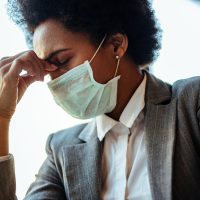Coping With More Days of Pandemic Uncertainty

We have vaccines, however the rollout has been slower than expected. COVID-19 is raging throughout many states. So how do we continue to maintain strong mental health during the next several months after enduring so much already?
The human being is hardwired to evaluate risks that can interfere with our wellbeing. However, these evolved responses can sometimes cloud rational thought, especially in response to new and dramatic threats like the coronavirus pandemic. These emotional responses and their impact skew how dangerous we perceive the “dread risk” to be. Evident when a single event causes harm to many people in a short time, such as plane crashes, natural disasters, or terrorist attacks. The images we are fed fire up parts of the brain that evolved to evaluate risk and make us take notice.
As new information emerges about COVID-19, it is difficult to navigate relative and absolute risk differences. Risk is impossible to define in absolute terms in a pandemic since it is relative to your age, overall health, pre-existing health conditions, and other personal factors. New Scientist reports, “An 80-year-old is 1000 times more likely to die from covid-19 than a 20-year-old,” but this is a statistic, and just because it can happen does not mean it will. An 80-year-old is likely to die from a population fatality rate as well. It is easy to conflate the pandemic fatality rate with the population fatality rate, skewing rational personal and public policy responses.
Gender and ethnicity are revealing big differences in the pandemic fatality rate. The Lancet reports men to have about twice to risk of death from COVID-19 in comparison to women. African Americans are almost twice as likely to die of coronavirus than white Americans. What is often left out of the reporting of these statistics is why these differences exist, for example it could be due to the fact that you are of a class already more vulnerable to infection due to widespread health inequities in the system.
Perspective is everything. Personal risk, as opposed to a collective threat, is very different. Calibrating your risk using various statistics from multiple sources can make it difficult to distill accurate information and increase our fear and anxiety levels. The US National Safety Council states the risk of dying in a motor vehicle crash as 1 in 106 during our lifetime. Yet we do not fear getting into our car. We learn to live with and minimize the risks inherent in driving.
Spending time assessing your risk of dying of COVID-19 should take on a similar tone. What can be done to mitigate risk like washing your hands, wearing a mask, and maintain social distance are the best ways we have now. However, no matter the statistics, keep doing the simple things. Control that which you can. Allison Schrager, an economist at the Manhattan Institute in New York, states, “Getting through this pandemic is essentially an exercise in risk management,” To handle it well, we must rely on the information we get from public health experts, our government, and the media.
When you think about controlling what you can, what springs to mind? Beyond maintaining your health during the coronavirus pandemic, what else can you act on to best control your life’s risks? You can make a very powerful choice to ensure your legal documents and estate affairs are in order. What if the unthinkable happens, and you were to die because of the pandemic? Or, more statistically likely, to die in a motor vehicle accident? Will you leave behind well thought out, legal documentation to protect your legacy and loved ones?
We are regularly meeting with clients over the phone, using Skype, FaceTime, Zoom, and other digital platforms to ensure you have options to create a will, trust, and other legal documents, or update your existing ones. Preparation is key to managing so many risks in life. Retaining an attorney to assist with your planning is part of risk management and being prepared for the certainty that no one lives forever. Relying on the expertise of elder law and estate planning professionals will ensure your legacy and heirs are protected.
To learn more about the basics of estate planning, click here.
We are here to help.
If you would like to discuss your particular planning needs, we would be honored to speak with you. Call Andre O. McDonald, a knowledgeable Howard County, Montgomery County and District of Columbia estate planning, special-needs planning, veterans pension planning, and Medicaid planning attorney, at (443) 741-1088; (301) 941-7809 or (202) 640-2133. We can schedule a time to review your existing estate planning documents, or create a new estate plan, to ensure that you and your family are protected.
DISCLAIMER: THE INFORMATION POSTED ON THIS BLOG IS INTENDED FOR EDUCATIONAL PURPOSES ONLY AND IS NOT INTENDED TO CONVEY LEGAL OR TAX ADVICE.











